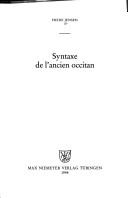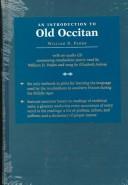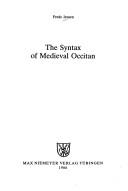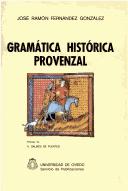| Listing 1 - 10 of 47 | << page >> |
Sort by
|
Book
ISBN: 9780198840176 0198840179 9780192576538 0191875724 0192576534 Year: 2020 Volume: 41 Publisher: Oxford Oxford University Press
Abstract | Keywords | Export | Availability | Bookmark
 Loading...
Loading...Choose an application
- Reference Manager
- EndNote
- RefWorks (Direct export to RefWorks)
This volume offers a wide-range of case studies on variation and change in the sub-family of the Romance languages that includes French and Occitan: Gallo-Romance. Both standard and non-standard Gallo-Romance data can be of enormous value to studies of morphosyntactic variation and change, yet, as the volume demonstrates, non-standard and comparative Gallo-Romance data have often been lacking in both synchronic and diachronic studies. Following an introduction that sets out the conceptual background, the volume is divided into three parts whose chapters explore a variety of topics in the domains of sentence structure, the verb complex, and word structure. The empirical foundation of the volume is exceptionally rich, drawing on standard and non-standard data from French, Occitan, Francoprovençal, Picard, Wallon, and Norman. This diversity is also reflected in the theoretical and conceptual approaches adopted, which span traditional philology, sociolinguistics, formal morphological and syntactic theory, semantics, and discourse-pragmatics. The volume will thus be an indispensable tool for researchers and students in French and (Gallo-) Romance linguistics as well as for readers interested in grammatical theory, sociolinguistics, and historical linguistics.
Grammar --- Historical linguistics --- French language --- Occitan language --- Provençal language --- Occitan language - Grammar --- Provençal language - Grammar --- French language - Grammar

ISBN: 3484522577 3110936143 9783484522572 Year: 1994 Volume: 257 Publisher: Tübingen Niemeyer
Abstract | Keywords | Export | Availability | Bookmark
 Loading...
Loading...Choose an application
- Reference Manager
- EndNote
- RefWorks (Direct export to RefWorks)
La "Syntaxe de l'ançien occitan" est essentiellement une révision de l'ouvrage du même auteur "The Syntax of Medieval Occitan", paru chez Niemeyer en 1986. Le livre est le premier à présenter une vue d'ensemble de la syntaxe occitane. Les règles syntactiques sont illustrées par de nombreux exemples tirés pour la plupart de la poésie des troubadours, mais la documentation s'étend à d'autres domaines également: chartes, textes archaïques (le "Boeci" et "la Sainte-Foi d'Agen"), vies de saints (la "Vie de Sainte Enimie"), ouvrages narratifs ("Flamenca" et "Jaufré") et divers textes en prose et en vers recueillis par Appel, Suchier, Bartsch, Koschwitz et d'autres anthologistes. La description syntactique ne se limite donc pas à la langue des troubadours, mais s'applique très généralement à l'occitan comme on l'ècrivait depuis les débuts jusqu'au XVe siècle. La terminologie est traditionnelle, et la description se veut synchronique, même si elle couvre plusieurs siècles d'usage syntactique. Le livre rendra service à tous ceux qui s'intéressent à la langue, la littérature et la culture occitanes du Moyen Age, et il comblera une regrettable lacune dans la philologie romane. La consultation du livre est facilitée par la présence d'une table des matières bien étoffée, d'un index des mots et d'un index analytique.
Provençal (Langue) --- -Lemozin language --- Old Occitan language --- Proensal language --- Provençal (Langue) --- Provencal language --- Occitan language --- Syntax --- Historical linguistics --- Provençal language --- Grammar --- anno 500-1499 --- Provençal language --- Lemozin language --- Romance languages --- Syntax. --- Syntaxe --- Provencal language - Syntax. --- ANCIEN OCCITAN --- SYNTAXE

ISBN: 0873522931 Year: 1998 Publisher: New York Modern Language Association of America
Abstract | Keywords | Export | Availability | Bookmark
 Loading...
Loading...Choose an application
- Reference Manager
- EndNote
- RefWorks (Direct export to RefWorks)
Provençal language --- Provencal language --- -Lemozin language --- Occitan language --- Old Occitan language --- Proensal language --- Romance languages --- Grammar --- -Grammar --- Provençal language --- Ancien occitan
Book
ISBN: 205100417X Year: 1982 Publisher: Genève Slatkine
Abstract | Keywords | Export | Availability | Bookmark
 Loading...
Loading...Choose an application
- Reference Manager
- EndNote
- RefWorks (Direct export to RefWorks)
Provençal language --- Poetry --- Comparative literature --- Provençal, Occitan literature --- Italian literature --- Dante Alighieri
Book
ISBN: 3772014380 3772014399 9783772014383 Year: 1979 Volume: 92/A-B Publisher: Bern Francke
Abstract | Keywords | Export | Availability | Bookmark
 Loading...
Loading...Choose an application
- Reference Manager
- EndNote
- RefWorks (Direct export to RefWorks)
Provençal, Occitan literature --- Historical linguistics --- Bible --- Provençal language --- anno 1100-1199 --- Glossaries, vocabularies, etc --- Provençal language --- Glossaries, vocabularies, etc.

ISBN: 3484522089 3111329275 9783111329277 9783484522084 Year: 1986 Volume: 208 Publisher: Groningen Niemeyer
Abstract | Keywords | Export | Availability | Bookmark
 Loading...
Loading...Choose an application
- Reference Manager
- EndNote
- RefWorks (Direct export to RefWorks)
Historical linguistics --- Provençal language --- Grammar --- anno 500-1499 --- Provençal (Langue) --- Syntax. --- Syntaxe --- Provencal language --- Syntax --- -Lemozin language --- Occitan language --- Old Occitan language --- Proensal language --- Romance languages --- -Syntax --- Provençal language --- Lemozin language --- Provençal (Langue) --- Provençal [Langue]. Syntaxe. --- Provençaals. Syntaxis. --- Provencal language - Syntax

ISBN: 8474681103 9788474681109 Year: 1985 Publisher: Oviedo
Abstract | Keywords | Export | Availability | Bookmark
 Loading...
Loading...Choose an application
- Reference Manager
- EndNote
- RefWorks (Direct export to RefWorks)
Historical linguistics --- Provençal language --- Occitan language --- Grammar, Historical --- Provencal language --- -Occitan language --- -Langue d'oc --- Languedoc language --- Provençal language, Modern --- Romance languages --- Lemozin language --- Old Occitan language --- Proensal language --- -Grammar, Historical --- Provençal language --- Langue d'oc --- Provençal language - Grammar, Historical --- Occitan language - Grammar, Historical
Book
ISBN: 0198157118 9780198157113 Year: 1975 Publisher: Oxford Clarendon
Abstract | Keywords | Export | Availability | Bookmark
 Loading...
Loading...Choose an application
- Reference Manager
- EndNote
- RefWorks (Direct export to RefWorks)
Poetry --- Provençal, Occitan literature --- Troubadours --- Provencal language --- Rhetoric, Medieval --- Versification --- -Rhetoric, Medieval --- Lemozin language --- Occitan language --- Old Occitan language --- Proensal language --- Romance languages --- Jongleurs --- Troubadors --- Musicians --- Poets --- Courtly love --- Trouvères --- Provençal language --- Provençal language --- Rhetoric, Medieval. --- Troubadours. --- Versification. --- Provencal language - Versification
Book
ISBN: 9783484523494 3484523492 9786612187872 1282187872 3484971320 9783484971325 9783111732381 311173238X 9781282187870 6612187875 Year: 2009 Volume: 349 Publisher: Tübingen Niemeyer
Abstract | Keywords | Export | Availability | Bookmark
 Loading...
Loading...Choose an application
- Reference Manager
- EndNote
- RefWorks (Direct export to RefWorks)
This dictionary of old occitan from Auvergne is based on about 200 original manuscripts pro-duced during the 1340-1540 period by consular, seigniorial and religious authorities of two regions of Haute-Auvergne (Mauriacois and Sanflorain in the present department of Cantal) characterized by a palatalized occitan (chabra, jausir). The editions of texts written in old occi-tan from Auvergne being rare (see references in the DOM) and often not reliable, it was neces-sary to work only on the original documents. This also allowed the discovery of many un-known manuscripts. The main part of the corpus constituting this dictionary comes from the city of Saint-Flour which kept the occitan language for administrative use until ca. 1540.This dictionary contains about 7,000 entries and more than 12,000 definitions representing words and expressions mainly of the juridical, commercial, artisanal and military domains. Words of the nature and wild life are less represented. All these terms are illustrated by one to several examples carefully edited. Many of these words and locutions are first occurrences. References to other publications dealing with old occitan (DOM, Lv, FEW, etc.) allow compari-sons with other dialects to be made. This dictionary, which differs from most of other dictionar-ies based on yet published texts, shows how a thorough study of the documents of a restricted area and period may improve our knowledge of old occitan.
Provencal language --- Occitan language --- French language --- French --- Dictionaries --- Provençal --- Occitan --- Provençal language --- Provençal language --- Occitan. --- Provençal. --- Provençal. --- French. --- Langue d'oïl --- Romance languages --- Lemozin language --- Old Occitan language --- Proensal language --- Provençal --- Provencal language - Dictionaries - French --- Occitan language - Dictionaries - French --- French language - Dictionaries - Provençal --- French language - Dictionaries - Occitan --- Auvergne --- Dictionnaire --- Occitan / Dictionary. --- Occitan / Language. --- Provencal.
Book
ISBN: 348452264X 9783484522640 Year: 1995 Volume: 264 Publisher: Tübingen Niemeyer
Abstract | Keywords | Export | Availability | Bookmark
 Loading...
Loading...Choose an application
- Reference Manager
- EndNote
- RefWorks (Direct export to RefWorks)
Poetry --- Old French literature --- Lays (Music) --- Songs, Provençal --- Provençal language. --- Provençal (Langue) --- History and criticism. --- Lai Markiol. --- Lai Nompar. --- Songs, Provencal --- Provençal language --- -Provencal language --- -Provençal songs --- Lemozin language --- Occitan language --- Old Occitan language --- Proensal language --- Romance languages --- Lais (Music) --- Part songs, French --- History and criticism --- Provençal language. --- Songs, Provençal --- -History and criticism --- Provençal (Langue) --- -Lemozin language --- Provençal songs --- Provençal language --- Lays (Music) - History and criticism. --- Songs, Provencal - History and criticism.
| Listing 1 - 10 of 47 | << page >> |
Sort by
|

 Search
Search Feedback
Feedback About UniCat
About UniCat  Help
Help News
News